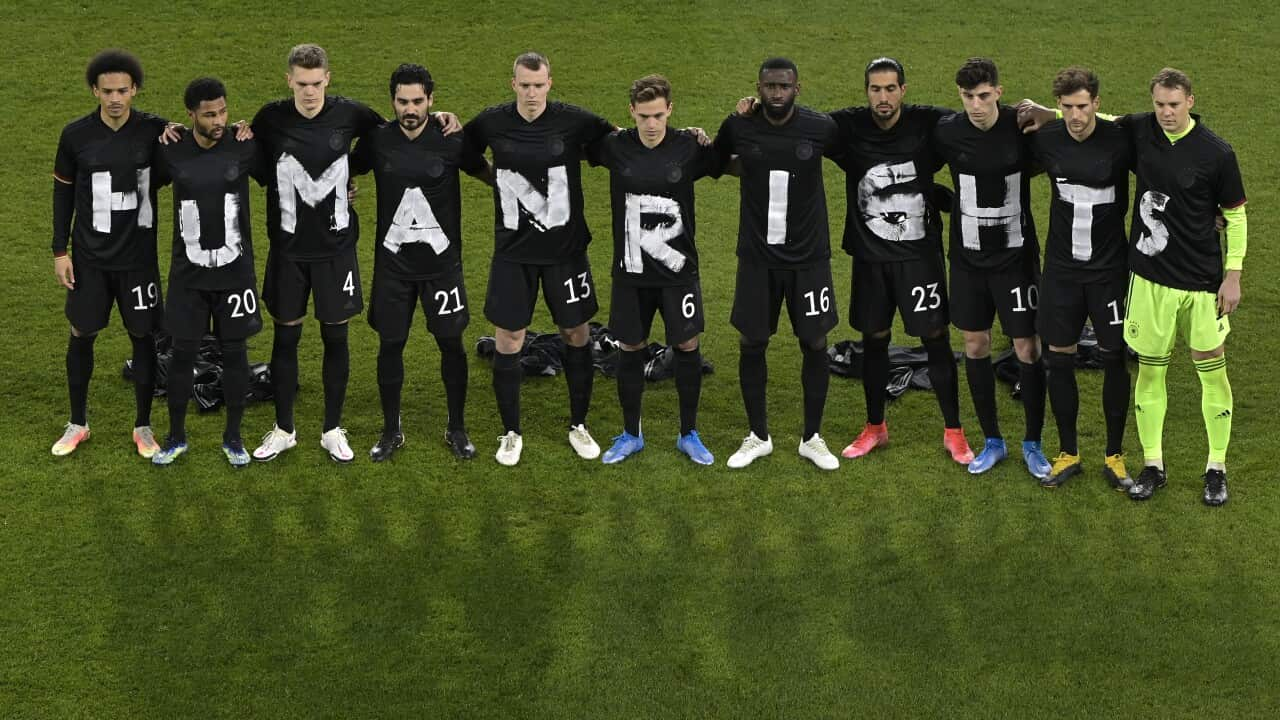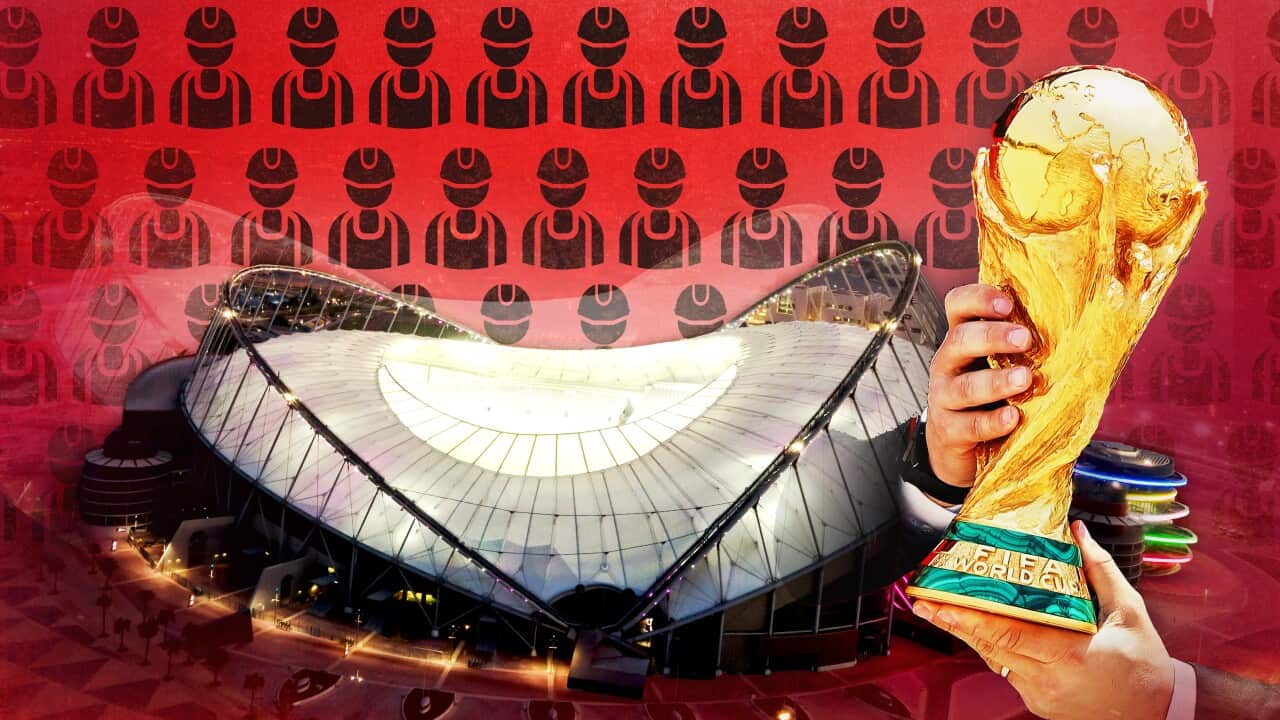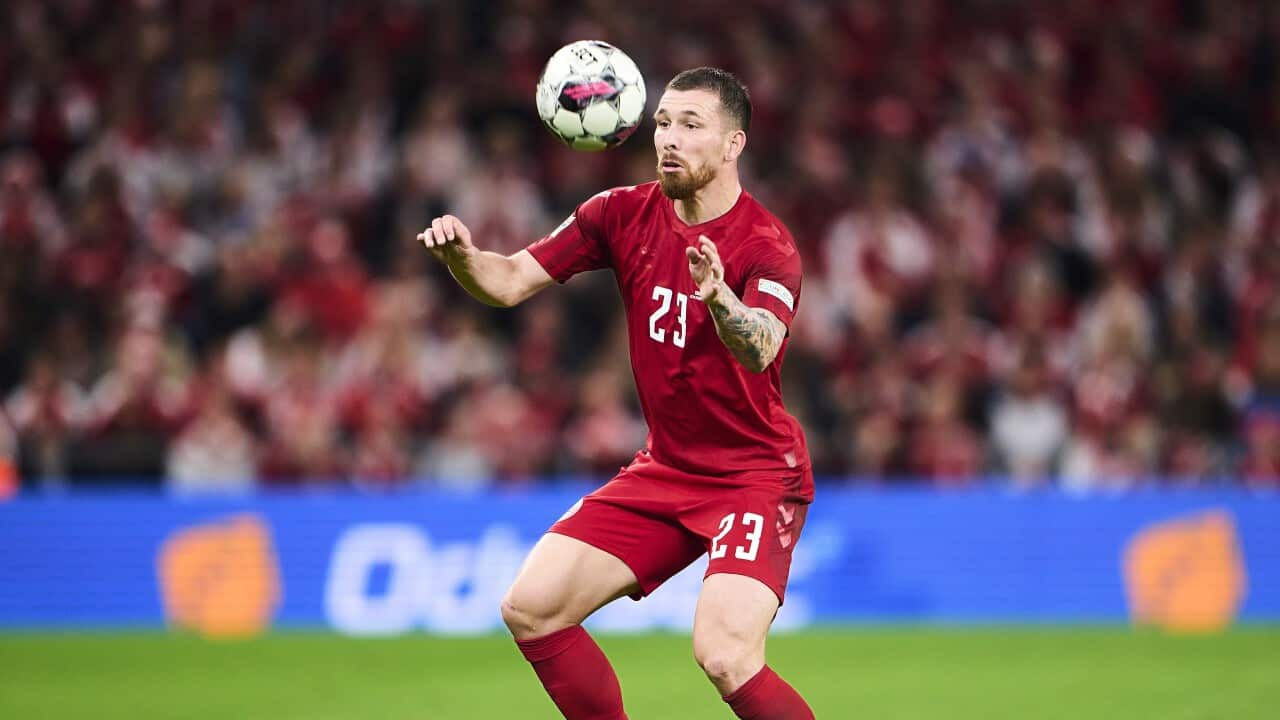Key Points
- The AFC Asian Football Cup 2023 will take place in Qatar from 12 January to 10 February.
- China withdrew from hosting the 2023 AFC Asian Football Cup due to its zero-COVID policy.
- After the 2022 World Cup, human rights groups say Qatar’s labour reforms "came too late" and "were narrow in scope".
In 2022, Qatar became the first Middle Eastern country to host football's biggest sporting event — the men's FIFA World Cup.
An oil-rich nation with grand ambitions and limited football history, Qatar established itself on the sports world stage by hosting a huge event, reportedly investing $9.7 billion over 12 years in seven new stadiums and one major stadium refurbishment.
Reportedly, the works also incurred a significant human cost.
The majority of those who constructed Qatar's World Cup infrastructure were migrant workers.
As reports emerged of numerous migrant workers — such as illegal recruitment fees, wage theft, injuries and unexplained deaths — human rights protests, primarily from outside the country, began.
However, according to a sports expert from Monash University, as the World Cup went into full swing, we all "focused on Messi" and started forgetting about human rights.
"The stadiums are built, those human rights issues were from a past event, and we're just going to consume them as a product now," Tom Heenan of the Monash Intercultural Lab said.
"In some ways, sports events have washed away the rights of the people who were responsible for building those stadiums."
University of Sydney Professor Betina Szkudlarek, an expert in international human resource management, said that the world "turned a blind eye" to the documented human rights violations.
"Despite numerous human rights violations reported before and after the World Cup, we can probably agree that the world largely turned a blind eye to the extensively documented abuse experienced by thousands of workers in Qatar," she said.
"The 2022 event was a great commercial success, and while AFC might raise again the voices of concerned human rights activists, those are likely to be less central with the upcoming Asian Cup."
Why is the 2023 Cup taking place in 2024?
The AFC Asian Football Cup 2023 will be played between 12 January and 10 February, featuring the participation of 24 men's national teams, including the Australian Socceroos.
The tournament is organised by the Asian Football Confederation (AFC), with matches being held at eight stadiums, including six arenas used for the 2022 FIFA World Cup.
Qatar will be hosting the football tournament for the third time, having staged it in 1988 and 2011.
China was supposed to host the tournament in 2023 but, because of its zero-COVID policy, it withdrew in May, leaving the AFC to search for a new host and finally select Qatar.
Due to Qatar's participation in the 2023 CONCACAF Gold Cup and the high summer temperatures, the event was postponed. However, the tournament will keep its original name for logistical and sponsorship reasons.
Have the issues related to human rights been resolved?
For the first anniversary of the 2022 Men's World Cup, the leading human rights organisation Amnesty International warned that the post-2022 World Cup legacy for migrant workers in Qatar is in "serious peril".
In a briefing titled A Legacy in Jeopardy, the organisation noted a fading commitment from the Qatari government toward fair conditions and decent work for the workers involved.
"As the glare of the world’s media spotlight dimmed, so too did the government’s push for fair conditions and decent work for the hundreds of thousands of men and women who helped realise Qatar’s World Cup dream," Amnesty International said in the report.

Members of Amnesty International hold a banner calling on Qatar and FIFA to compensate the affected migrant workers who made the World Cup possible, in The Hague on 29 November 2022. Source: Getty / Bart Maat/ANP/AFP
The organisation Human Rights Watch "the shameful human rights legacy of the 2022 World Cup and the inadequacies of Qatar’s labour reforms, which ... came too late, were narrow in scope, and weakly enforced".
"It is now over a year since the 2022 World Cup and the Qatari authorities have still failed to provide compensation to migrant workers for widespread abuses, including wage theft and the unexplained deaths of workers who prepared and delivered the tournament," Daniela Gavshon, Human Rights Watch's Australian director told SBS News.
She said that the post-tournament economic slowdown had introduced new vulnerabilities for the migrant workforce.
"Many workers were compelled to wait in Qatar despite unpaid wages or end-of-service benefits because they risked losing their wages if they left the country."
Gavshon said that Qatari authorities had deflected the calls for remedy, claiming the criticism was racist and "falsely insisting" that existing compensation mechanisms to address the longstanding abuses were adequate.
SBS approached the Qatari government for comment but had not received a response by the time of publication.
Why are human rights protests not kicking off now?
Following the disclosure of a concerning number of unexplained deaths among migrant workers prior to the 2022 World Cup, critics, human rights advocates, and even players united in their condemnation of the alleged human rights violations.
The Socceroos were not an exemption, releasing a video that raised concerns about the "suffering" of migrant workers and the inability in Qatar of LGBTIQ+ people "to love the person that they choose".
The Qatari authorities called the criticism "a Western media campaign".
"The campaign that the Western media launched to criticise human rights conditions in Qatar was not unprecedented," Abdulrahman al-Marri from Qatar University wrote in a report for the Carnegie Endowment for International Peace.
"The campaign was launched the moment Qatar officially announced its candidacy to host the World Cup, and as time passed, the criticism acquired a permanent, systematic, and confrontational character, with only a few moderate voices here and there."
According to Steve Georgakis, a senior lecturer of pedagogy and sports studies at the University of Sydney, the smaller geographical scope of the upcoming event is the primary reason not as much criticism of Qatar is being heard.
"It is the Asian Cup, which means it will only involve countries from the Asian Football Confederation," Georgakis told SBS News.
"Most of the machinations at the Qatar World Cup came from Western countries. These countries are mostly not part of this confederation — they are mostly part of UEFA (Europe). [Although] there are exceptions, such as Australia."
In preparation for the Asian Cup, Socceroos coach Graham Arnold said that Doha is like "a second home" for the team.
"It’s like a second home for us," he said during a press conference in December.
"When we couldn’t come back and play here in Australia with COVID we had our World Cup qualifiers in Qatar."
Football Australia has been approached for a comment.
'The best World Cup ever'
Experts say it was only logical to award Qatar the Asian Cup hosting after China withdrew, as the country had already proven its ability to organise top-quality football tournaments and possessed all of the necessary infrastructure.
Reflecting on the 2022 event, FIFA president Gianni Infantino described it as "the best World Cup ever".
"They pulled off an amazing World Cup, which some argued was the best ever," Georgakis said.
"Qatar has a very strong link with the AFC. For example, they are sponsoring many of the international football tournaments in the next few years."

Members of the press arrive at the media centre for the 2023 AFC Asian Cup in Doha, Qatar, on 6 January 2024. Source: Getty / NurPhoto
"How seriously do we take human rights issues when it comes to sports?" he said.
"When we ignore things like an Asian Cup, but we really raise them when there's a World Cup."
He said we need to take seriously the idea of "sportswashing", which describes the use of sport to redirect public attention away from unethical conduct.
"Has the washing really begun? Does the washing continue? Is there a flow on from the World Cup?" he said.
"There's this mantra that sports and politics don't mix. They probably don't mix, but sports and politics are inseparable."
Heenan believes that the recent shift in media attention is partly due to the ongoing , with daily reports about thousands of lives lost.
"Are we operating in a changed environment from the time when the World Cup was on?" he said.
"Given tensions in the Middle East and tensions in the Gulf, has this taken away attention from the event itself and the issue of human rights? The media oxygen now has shifted, and what's happening in Gaza has really changed that."





